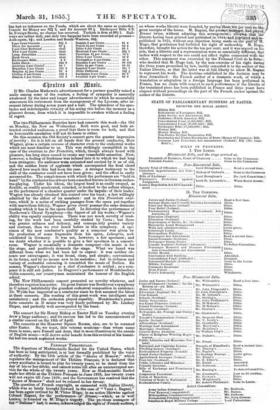THEATRICALS.
The departure of Mademoiselle Rachel for the United States, which has been so long anticipated, is .at 'last formally prohibited by the voice of authority: By the 12th article of 'the "decree of Moscow," which regulates the management of the Theatre -Francais, it is declared that . every societaire is bound to play for twenty years, to be dated from the day of his. or her debfit, and cermet retire till after an uninterrupted ser- vice for the whole of the twenty years. Nbw as Mademoiselle Rachel made her debt at the Theatre Francais in•June 1838, her twenty- years will not expire till June 1858; and the Government has resolved that the "decree of Moscow" shall not be relaxed in her favour.- The question of French copyright, as connected with Italian libretti, which was so lately brought forward in the ease of " Vatel v. Ragani,' has been again revived by M. Victor Hugo, in an action likewise against Colonel Ragani, for the performance of Ernetni,—which, as. is well known, is founded on M. Hugo's tragedy. The previous managers of the "Italians" had, it seems,-acknowledged the right of French authors, on whose works libretti were founded, by paying ,ten per cent on the-',
gross receipts of the house. M. Ragani, the pt:inattager, had played'
Ernani twice, without adopting this arrangeme alleging that di' libretto having been printed and published in 184-4Kandkprinted and re- published in 1851, without any objection being made•on the part of M. Hugo, that gentleman had forfeited his right of authorship. Id. Huge, therefore, brought his action for the ten per cent; and it was argued-on his side, that a libretto and a representation were so essentially different, that Inches with respect to the one could not affect rights connected With the other. This argument was overruled by the Tribunal Civil de lit:Seine ; who decided that M. Hugo had, by the non-exercise of his right during the three years prescribed by law, tacitly conceded it to the author of the Italian libretto, so that the latter was at full liberty to allow MI Regard to represent his work. The doctrine established in the decision may be thus formulized : the French author of a dramatic work, of which a translation or adaptation in a foreign language has been performed in France, has no claim with respect to such performance if the libretto of the translated-piece has been published in France and three years have elapsed without proceedings on the part of the French author against the author of the libretto.


























 Previous page
Previous page